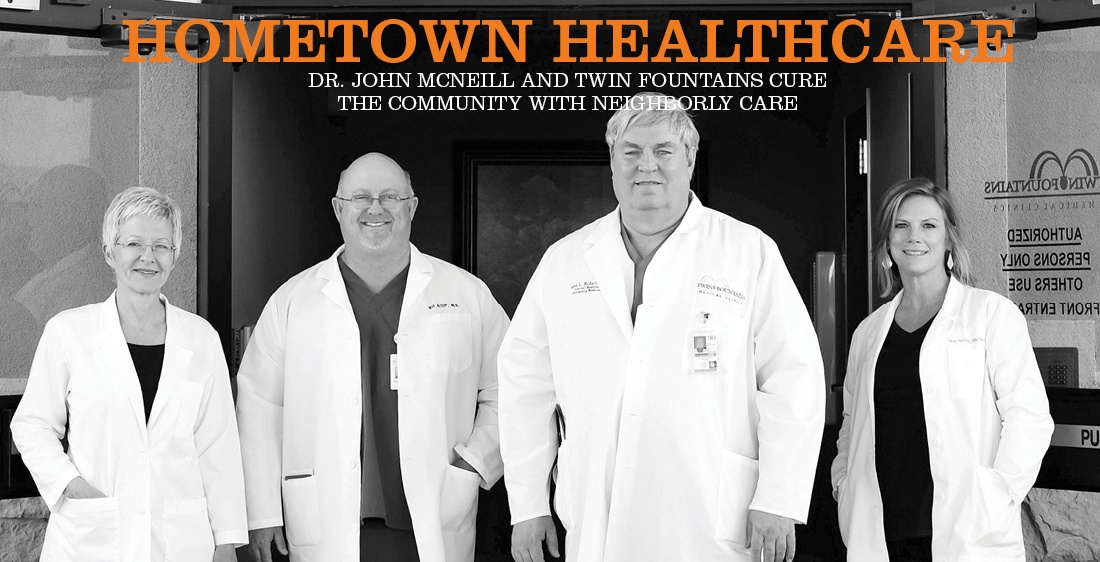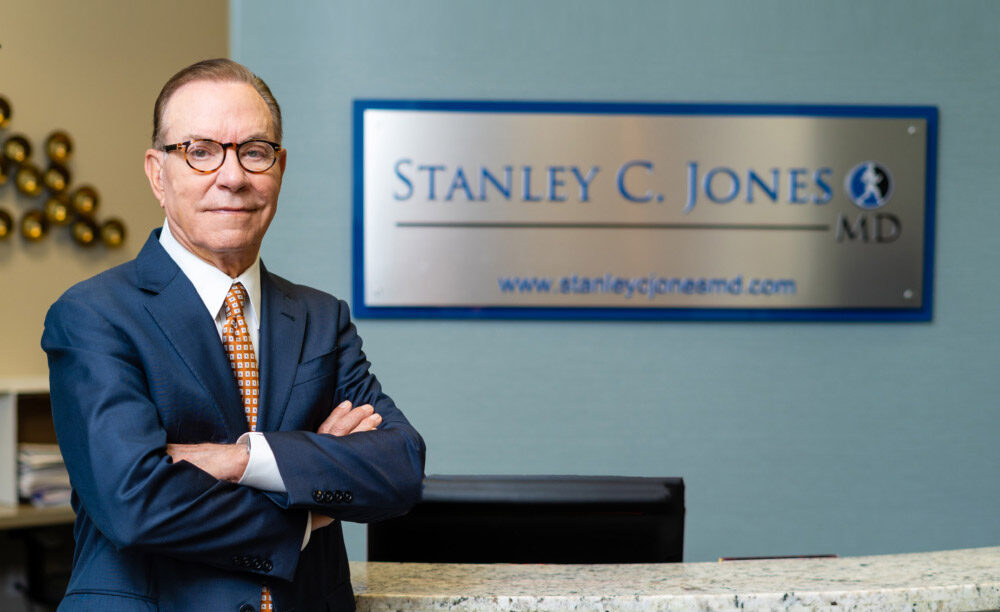Dr. John McNeill’s smile starts in his kind, observant blue eyes and spreads to fill his face. That smile and the expression in his eyes say, “I’m listening to you and learning about you so I can take care of you.”
Imagine yourself driving in Central Texas many years ago. Without warning you’re in a terrifying accident. You hear sirens; you know you’ve been hurt. John McNeill’s face as a young paramedic is the first you see. You fix your eyes on his, and your terror subsides. He quickly stabilizes you. You are safe.
For 12 years, McNeill gave emergency care to the people in Central Texas where he worked as a paramedic. It pushed him to his next step. In 1997, he finished medical school. After his internship and residency through the University of North Texas Health Science Center, he went home to Victoria eventually becoming a board-certified physician in two disciplines, internal and emergency medicine.
He started a primary healthcare practice. It grew enough to where he needed an additional physician. Not finding the right candidate, he decided to trim his practice and begin working full-time as an emergency room doctor.
 He remembers nine years of working days and demanding nights in the ER. “I was single. It’s the only way I could do it,” McNeill says. Laughing, he adds, “And had I stayed there, I’d still be single!” One night, thinking about how to free himself from his night job, he grabbed a note pad for recording patient progress. He drew a diagram of what he thought a walk-in clinic should look like.
He remembers nine years of working days and demanding nights in the ER. “I was single. It’s the only way I could do it,” McNeill says. Laughing, he adds, “And had I stayed there, I’d still be single!” One night, thinking about how to free himself from his night job, he grabbed a note pad for recording patient progress. He drew a diagram of what he thought a walk-in clinic should look like.
But why a walk-in clinic?
“I wanted to see patients and take care of people…a lot of people,” McNeill shares. In the ER, he was seeing patients with everything from gunshot wounds to sore throats. McNeill’s vision was to provide walk-in and after-hours care, seven days a week for people who didn’t really need an emergency room. The sore throat there meant waiting hours to be seen and a bill for $1500.00.
His clinic would offer immediate treatment for less than a tenth of the ER cost. He also wanted a way to take care of patients in urgent circumstances, women in labor, wounds needing sutures, fractures, people with symptoms of stroke or heart attack. Reaching back to his days as a paramedic, he designed a clinic with all the services necessary to stabilize patients making them ready to go to the hospital or for a 911 call.
The name came to him in a dream, he would call his clinic Twin Fountains. He bought land on Sam Houston drive, and with a loan of $1.5 million, he turned his drawing into the building he’d imagined. John McNeill opened his first walk-in clinic on January 2nd, 2008. “The first day, we saw four patients. I was a little bit worried. But you know, I was right. The need was there. We just grew and grew,” McNeill recounts.

McNeill had good relationships with Victoria’s hospitals. He told them his clinic was not a competitor but a referral source. CT scans, MRI results, and full-blood workups would be available for hospital doctors to evaluate and devise a care strategy for those they’d be admitting.
“We were more a partnership with the hospitals than in competition. So it worked out well,” McNeill says. McNeill also partnered with a local laboratory. His clinic became a blood-drawing site for the lab, and his patients could go there for on-site blood work.
McNeill had to continue working full-time at the ER and part-time at Twin Fountains for two more years. Finally, the clinic was self-supporting. He had done it. His nights as an ER doctor were over. He was now practicing medicine full-time at Twin Fountains.
But his practice as an emergency care doctor wasn’t over. One day a construction worker walked into the clinic and said his head hurt. Speaking normally, he said a pipe had fallen on his head. But he didn’t remember it. His supervisor told him he was unconscious after he was hit. A nurse began to examine him. She saw liquid leaking from his nose and ear that looked like cerebral spinal fluid. An immediate CT scan showed he had a fractured skull and was bleeding into his brain.
Suddenly, the man began to lose consciousness. Multiple IVs and endotracheal intubation by Dr. McNeill kept him stable until EMS arrived. After a long hospital stay, he still has effects from the injury, and Dr. McNeill is now one of his primary care physicians.
“A brilliant physician I respect told me something years ago, ‘If it’s good for the patient it’s good for the practice” -Dr. John McNeill
Twin Fountains grew as a business. He opened a walk-in clinic in Rockport. The need was certainly there, too. A lot of winter Texans and elderly people live there, and there was no emergency room. The nearest was in Aransas Pass, 10 miles away.
In Victoria, McNeill built another walk-in clinic, a primary care clinic and an occupational medicine clinic. He did this while also designing and building a clinic in Port Lavaca and two in Beeville.
Victoria has oil fields, supply companies and a big community of people who work in them. OSHA and the Department of Transportation require these workers to be screened, tested and fitted for safety masks. As McNeill saw more and more of this group of patients he recognized it was a repeat of wasted hours in the ER waiting for care and a huge cost to employers. If 10 workers came to his clinic, nine would wait while the tenth was examined.

So he dreamed up another clinic, a contemporary horse and buggy. He designed and commissioned a 43-foot, fully mobile clinic that met all OSHA and DOT standards. On board were a doctor and staff. McNeill was taking medicine to his patients. Today, the mobile clinic has contracts with school districts as well as industrial sites.
John McNeill’s life outside his practice also grew. He married, and two years ago, his twin daughters, Sydnie and Sophie, were born. Now, McNeill wanted to spend his time with his patients and family. But his increasing role as a businessman was straining those needs.
“I wanted to grow up with my kids. I was spending more time in my office than in the examining room. I’m not built to be behind a desk. It’s just that simple. I’m an outside guy,” McNeill explains. That fits the man who keeps an up-to-date EMT Paramedic license.
One day, while examining a patient, a receptionist told McNeill someone was on the phone asking if he’d be interested in talking about selling Twin Fountains. NextCare was calling. It’s the country’s leading, privately held, provider of urgent care and occupational health services. They operate 135 clinics in 10 states.
“I wanted to see patients and take care of people…a lot of people” -Dr. John McNeill
Dr. McNeill says he didn’t create Twin Fountains to sell it. “I really was minding my own business, seeing patients, when that call came,” McNeill recounts. But he decided to have dinner with them and hear them out.
Eight years after founding the business, all the clinics were doing well. But the practice of medicine had changed. For McNeill, this was interfering with his central goal of taking care of people, and it meant much more time in front of a computer entering government required data for each case.

“Medicine today is complex. Taking care of patients is the easiest part to me. Compliance is the hard part. You pretty much need an expert for that,” McNeill explains. And paying the salary for an expert was beyond what he could afford. “I was too small to be big and too big to be small,” McNeill says.
After four months of negotiation with NextCare that McNeill describes as one of the best experiences of his life, Twin Fountains had a new owner. “NextCare took it to a level of professionalism I could not believe. They have been nothing but fair and honest. They bring a level of integrity,” McNeill explains.
At the time of the sale, McNeill was building another clinic in Alice, and that will continue to go forward. Beyond the ability of NextCare to take over all administrative duties, was the value it brought to his employees.
But first he had to deliver the news. “I had to tell more than a 100 people I was selling the companies, and that was rough to do. We’re close. For the most part, I knew most of these people, knew their families, knew their life stories. For a lot of them I was their family doctor,” McNeill recounts. As a fifth-generation native, he would be talking to family.
“It’s still Twin Fountains. This is my hometown. The people they treat are my friends and neighbors” -Dr. John McNeill
 He told them NextCare could provide world-class systems and support, better insurance and a 401K, something he hadn’t been able to do. Further, NextCare offered job stability to wives of oil field workers. They had to give up their jobs when their husbands transferred to another city. With 40 clinics in Texas, these wives stood a better chance of keeping their jobs.
He told them NextCare could provide world-class systems and support, better insurance and a 401K, something he hadn’t been able to do. Further, NextCare offered job stability to wives of oil field workers. They had to give up their jobs when their husbands transferred to another city. With 40 clinics in Texas, these wives stood a better chance of keeping their jobs.
Most importantly, for John McNeill, NextCare has the same commitment to patients he does. “A brilliant physician I respect told me something years ago, ‘If it’s good for the patient it’s good for the practice,’” McNeill shares, adding that, “It’s still Twin Fountains. This is my hometown. The people they treat are my friends and neighbors.”
For more information visit www.tfmc.nextcare.com.







Recent Comments